

2023 Impact Report
Caring for Our Communities (CFOC), spearheaded by the Jennie Edmundson Foundation, is a community-based program that connects high-risk, low-income and underserved individuals with local resources to help overcome barriers and regain control of their health and well-being.
Joining Forces for a Healthier Community
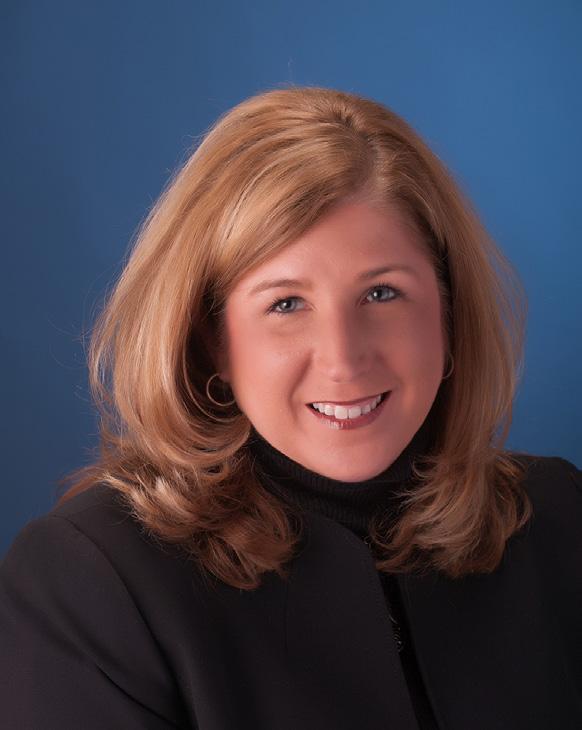 Tara Slevin, Chair, Caring for Our Communities
Tara Slevin, Chair, Caring for Our Communities
2023 was an exhilarating journey of growth as we welcomed new stakeholders, funders, and partners into our Caring for Our Communities (CFOC) Family.
The unveiling of our 2023 Annual Report is a moment of pride for us all! Throughout the year, we embraced collaboration within our organization and alongside our partners and funders in the communities we serve. Our focus deepened on tackling barriers and social determinants of health that affect our vulnerable community members. Together, we provided vital resources, knocked down obstacles, and offered hope, support, and confidence to individuals as they navigated their paths.
The unwavering support from our stakeholders, funders and partnering organizations has allowed us to achieve more than we could alone. We believe in the resilience and growth potential within each person, evident in the daily milestones of those served by CFOC. A glimpse into some of their inspiring stories are shared in our annual report.
We are so fortunate to reside in a community that is caring, compassionate, and gives generously. Thanks to the


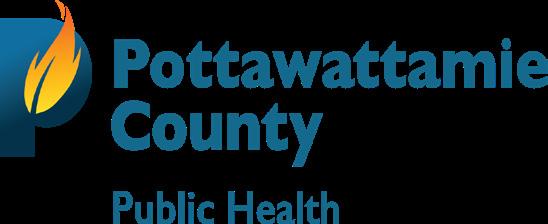

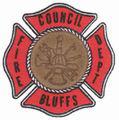
generosity of our philanthropic donors, 100% of every dollar donated has fueled our voucher program, enhancing access to care, providing nourishing food, and alleviating economic insecurities. It has also supported the delivery of community health coaching and navigation support services through our CFOC Community Health Coaches. In 2023, CFOC provided vital support to 3,472 individuals.
You will witness our collective dedication to the communities we serve as you review our report. It also serves as a heartfelt thank you to our stakeholder organizations who have stood by us as we expanded our outreach to aid some of our most vulnerable neighbors.
We welcome your involvement. To discover how you can contribute or support our mission through a financial donation, please reach out to me at tara.slevin@ nmhs.org or cfoc@nmhs.org.
It is a privilege to serve alongside our exceptional CFOC Leadership and Community Teams, as we continue our commitment to creating a healthier, more vibrant community together.
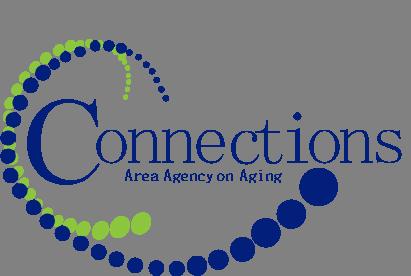
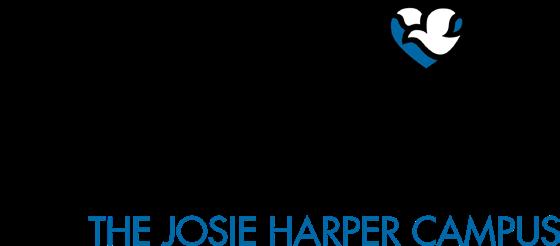
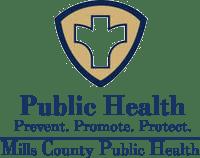
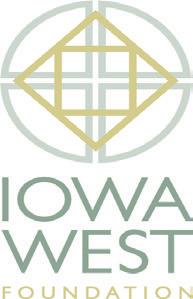
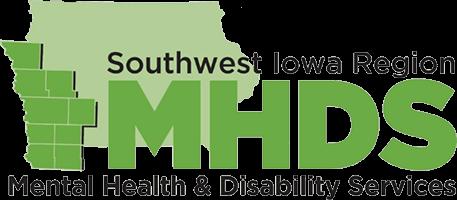
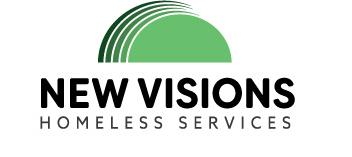
 Working in partnership with over 20 social service agencies, non-profit organizations and community partners throughout Pottawattamie and Mills Counties.
Working in partnership with over 20 social service agencies, non-profit organizations and community partners throughout Pottawattamie and Mills Counties.
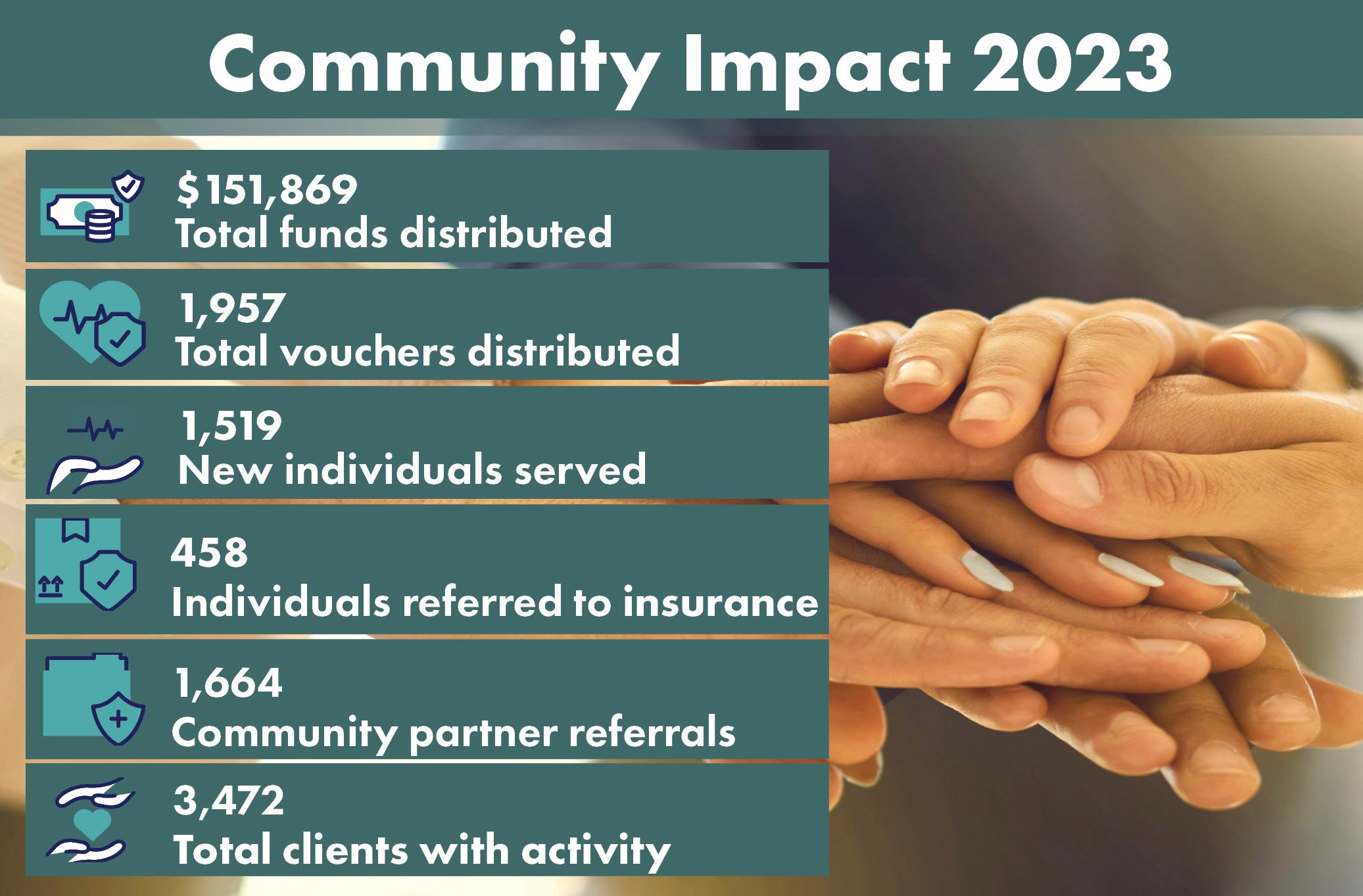
Keith Family Gives Back to Mills County
Caring for Our Communities (CFOC) reaches into neighboring counties such as Mills County, IA, which grapples with an 8.9% poverty rate. It’s a common scenario where many residents attempt to access necessary medical care but encounter numerous hurdles. Healthcare is more than just hospital visits; it involves addressing challenges of social determinants of health, such as difficulty finding transportation to appointments and lack of access to medical care.
Linda Goos and the Keith Family play a vital role in CFOC’s work in Mills County. Affectionately known as the Keith Klan, this family has dedicated over twenty years and three generations to fundraising for the betterment of Mills County. Their fundraising work began with Relay for Life, spurred on by personal battles with cancer within their family. Motivated by these experiences, the Keith Klan turned their attention to their local community, contemplating additional ways to assist those facing similar challenges.
For Linda, learning about the Jennie Edmundson Foundation’s work led to a natural connection in ideas and actions. The Foundation unites community resources and leverages them to enhance healthcare services in the area and at Methodist Jennie Edmundson Hospital. CFOC resonated deeply with the Keith Klan’s mission of aiding individuals
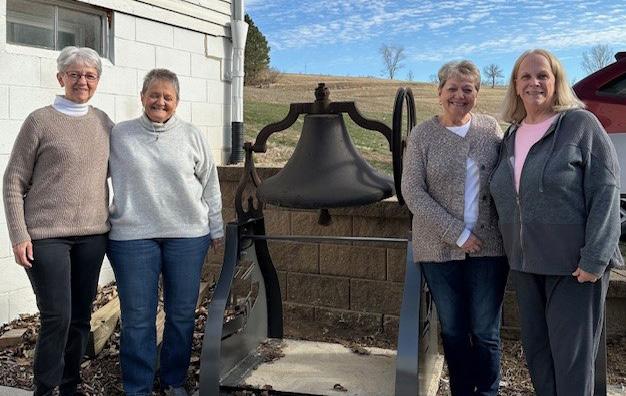
within their local community, as it also prioritizes addressing the social determinants of health that pose challenges to community members.
The Keith family works towards helping their Mills County community is through an exciting tool: bingo. Linda states, “Bingo is a way to connect with a variety of people. Not only do we raise money, but we are giving others a way to connect and have a good time.” Recently, they hosted a free children’s bingo event with gifts for the kids and a hot dog lunch sponsored by the Mills County Historical Museum. Events like this allow Mills County families to come together to enjoy some games, socialize, and take a break from everyday struggles.
It also helps everyone remember that, as the Keith Klan says at the end of every bingo event, “We are blessed!”
Answering the Call:
Expanding Our Collaborative Partnership with Police and Fire
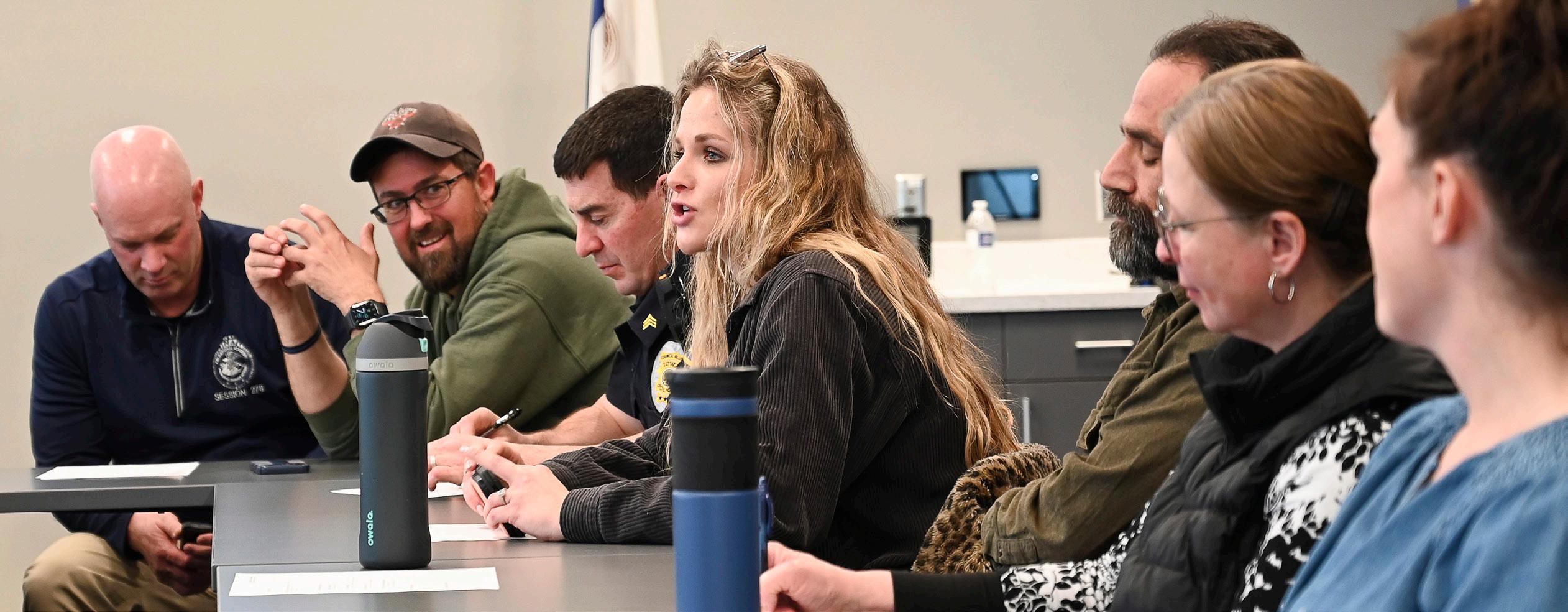
As we reflect on the past year at CFOC, there’s a resounding theme that echoes through our work: partnership. In particular, our deepening collaboration with the local police and fire departments stands as a testament to our commitment to community service and safety. Under the banner of “Answering The Call,” we’ve not only expanded our efforts but also working to strengthen the very fabric of our neighborhoods.
This year, we didn’t just maintain the status quo – we raised the bar. The collaborative efforts within the police and fire departments have expanded into new territories, reaching deeper into the heart of our communities. A prime example of this expansion is the 90-day taskforce, the Homeless Outreach Project (HOP), established within the Council Bluffs Police Department. Comprising three dedicated officers and a sergeant, the HOP team is committed to connecting with homeless individuals in Council Bluffs. Their mission? To gather and disseminate crucial information about available assistance programs, all while developing a comprehensive and compassionate response model for homeless persons within our community that can be shared with all of our CFOC partners.
Council Bluffs Police Chief Matt Davis shared, “I am extremely proud of our officers leading the Homeless Outreach Project (HOP). While law enforcement cannot solve issues related to homelessness on its own, the CBPD is working with our partners to concentrate
efforts on identifying individuals in need, making connections which lead to positive results, and working to create a healthy and safe community for everyone. We will accomplish this through a blend of enforcement, community caretaking, and ensuring we support effective referrals to social services.”
This collaborative approach extends even further through the partnership with the Bluffs Street Outreach team. Together with organizations such as the Southwest Iowa Region for Mental Health, New Visions Homeless Services, Micah House, and Heartland Family Service, we are weaving a robust safety net for those in need. These organizations are not merely service providers; they are advocates and educators, working tirelessly to strengthen individuals, families, and communities. Through guidance and social assistance, they empower individuals and families, ensuring they are not just recipients of aid but active participants in their own well-being.
Our commitment to those who serve on the front lines goes beyond words. Through funding from the Iowa West Foundation and support from the Fire and Police Chiefs, we will be adding a new position in early 2024, First Responder Community Coach (FRCC). As an integral part of the CFOC team, this new position embodies collaboration, flexibility, and adaptability, while focusing on vulnerable community members of all ages who typically are underserved.
(Above) Nonprofits and emergency services meet monthly to work on strategic planning and updates from their organizational work with the vulnerable populations in our communities. These meetings help support further collaboration and sharing of resources.
While based out of the police department, the FRCC will also partner with the Council Bluffs Fire Department (CBFD) and EMS. Justin James, Council Bluffs Fire Chief, emphasizes the critical need for integrated resources, stating, “CFOC ensures our resources work together seamlessly. It allows us to pilot innovative ideas, enhancing collaboration for timely and effective care.”
As we set our sights on the future, our commitment to this partnership remains unwavering. We’re not just here to answer the call – we’re here to lead the charge. Through collaboration, innovation, and a shared vision of a safer, stronger community, CFOC and our partners in law enforcement and fire rescue will continue to work hand in hand with local agencies and hospitals to make a tangible difference, one life at a time.
One example of our collaborative efforts is our work to support the homeless population. In addition to the Homeless Outreach Project (HOP), CFOC is partnering with Methodist Jennie Edmundson Emergency Department and Nebraska Methodist College (NMC) to provide healthcare screenings and services at the New Visions Homeless Services’ 24-hour emergency shelter, Joshua House.
We are also enhancing the discharge process from the emergency department to New Visions Homeless Services, ensuring continuity of care. Through this partnership, NMC’s nursing, occupational therapy, and respiratory therapy students engage with patients who lack access to basic healthcare services. These students offer complimentary blood pressure and diabetes checks, medication assessments, and mental health screenings. These clinics directly address social determinants of health concerns, providing a holistic continuum of support alongside ongoing referrals.
In closing, we invite you to join us in celebrating this remarkable journey of partnership and progress. Rachel Reis, Director of Community Health at Methodist Jennie Edmundson Hospital, summarizes our approach, “Caring for Our Communities is based on the principle that no one agency or sector can solve society’s most prevalent issues alone.” This collaborative approach acknowledges the interconnectedness of various stakeholders and sectors in effectively addressing community needs.
Together, we are answering the call, expanding our horizons, and collectively building a brighter future for all.
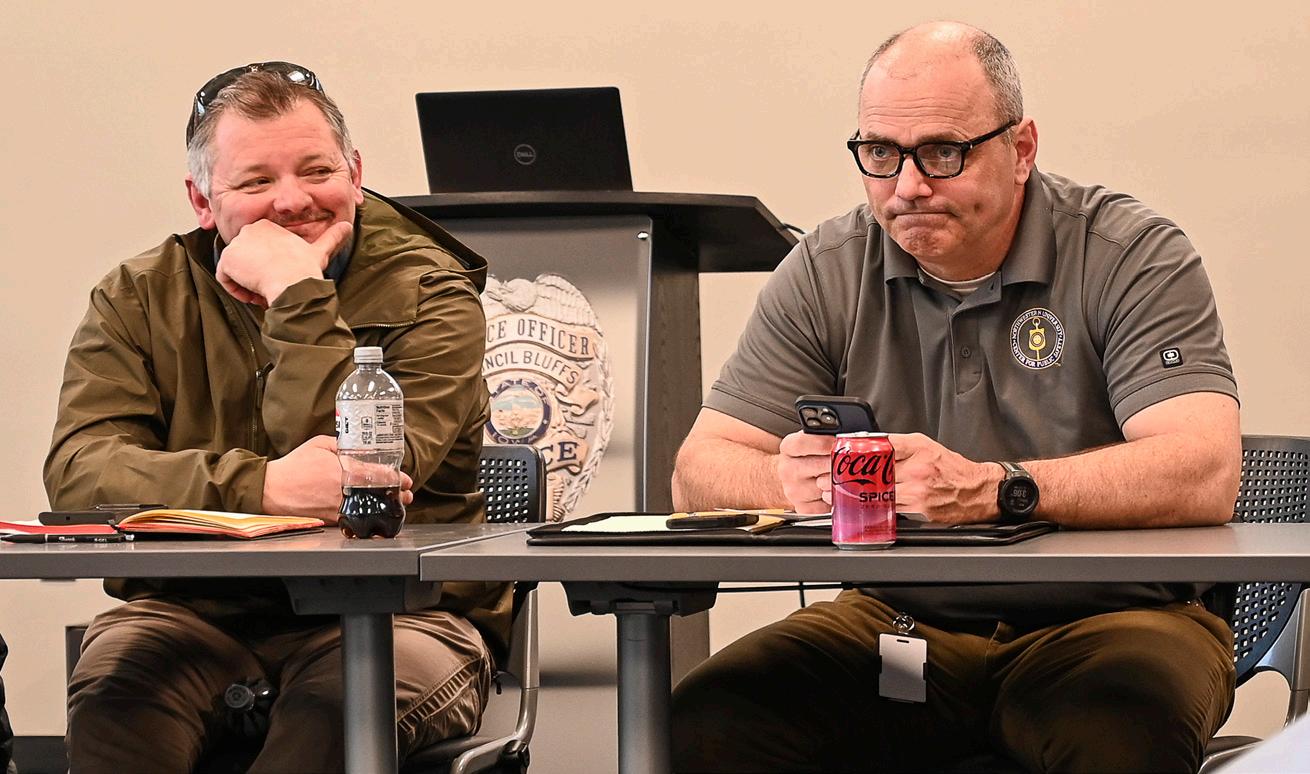

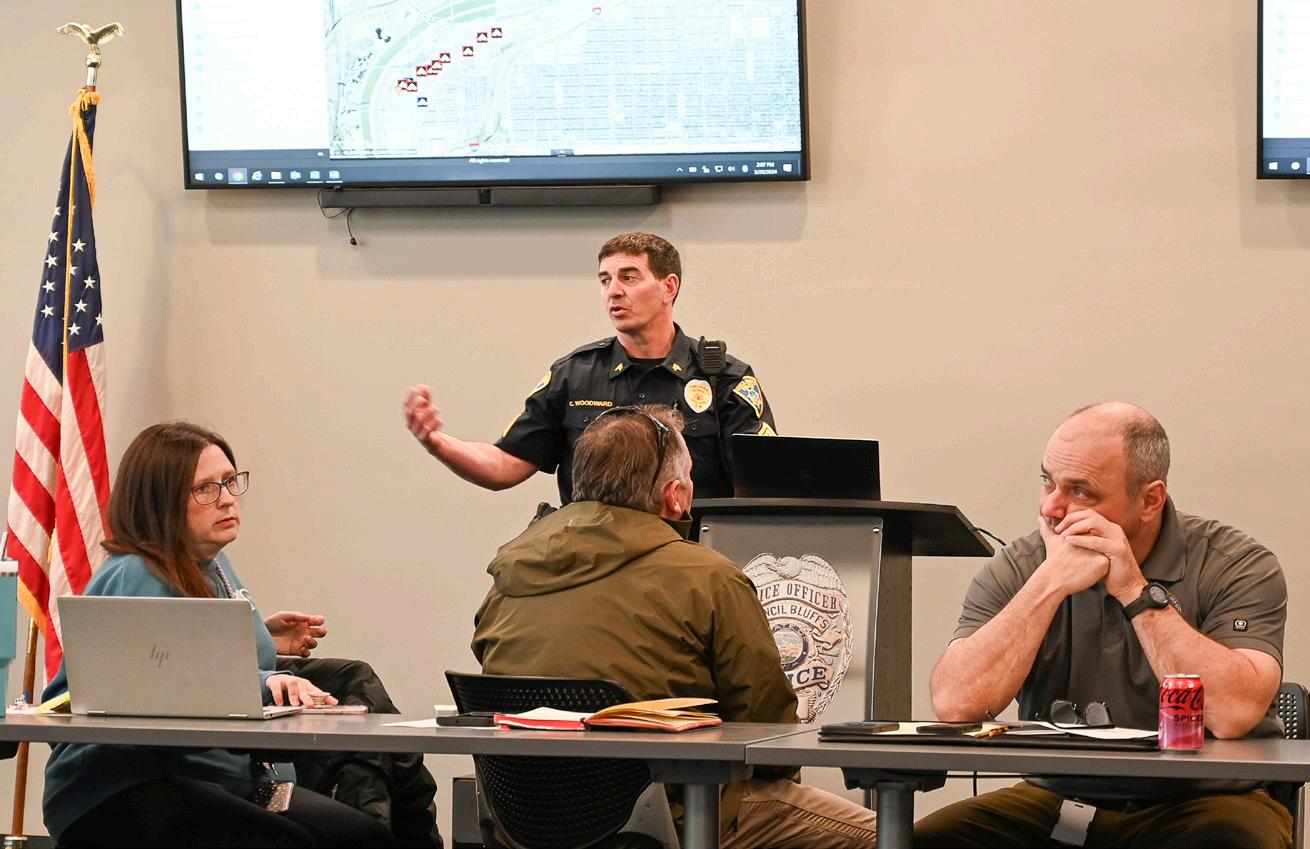 (Above) Council Bluffs Fire Department Chief Justin James, along with Council Bluffs Police Department Chief Matt Davis, engage in discussion for those working with homeless population.
(Above) Alicia Whitehill, RN, Community Clinical Coordinator at Nebraska Methodist College, presents statistics about individuals who attend the free clinics held at New Visions Homeless Service (NVHS).
(Above) Sergeant Cory Woodward, leads a discussion in regards to current identified homeless camps in the community. HOP has been instrumental in working with the homeless population within these camps and helping them seek additional services needed.
(Above) Council Bluffs Fire Department Chief Justin James, along with Council Bluffs Police Department Chief Matt Davis, engage in discussion for those working with homeless population.
(Above) Alicia Whitehill, RN, Community Clinical Coordinator at Nebraska Methodist College, presents statistics about individuals who attend the free clinics held at New Visions Homeless Service (NVHS).
(Above) Sergeant Cory Woodward, leads a discussion in regards to current identified homeless camps in the community. HOP has been instrumental in working with the homeless population within these camps and helping them seek additional services needed.
Growing Demands:
Why We’re Expanding Our Team
Over the past few years, Caring for Our Communities (CFOC) has witnessed a significant rise in demand for our crucial community services and navigation support. This increase is driven by the complexity of the individuals referred into our program, highlighting the growing needs within our communities.
Our continued collaboration with local partners and individuals has emphasized the profound impact we can collectively achieve. It is with immense gratitude for the support from our grantees and donors that CFOC took a pivotal step forward in late 2023: expanding our team with the addition of two positions. This strategic move enables us to meet the rising demands for our services and advance our mission of care and support for those we are privileged to serve.
Meet Julia Davis, our Community Health Worker (CHW) who is embedded within Methodist Jennie Edmundson, working alongside our case management and social work teams to support high-risk, vulnerable members with safe discharges back to their homes and communities. Julia’s role is crucial as she connects patients with resources to address the social determinants of health. She explains, “When meeting new patients, they often seek refuge and safety before addressing their health concerns. Listening, encouraging, and understanding their needs can change their outlook.”
CFOC serves as a starting point for challenges like housing, food shortages, utilities, and safety supports. Julia adds, “Providing resources like medication vouchers lifts
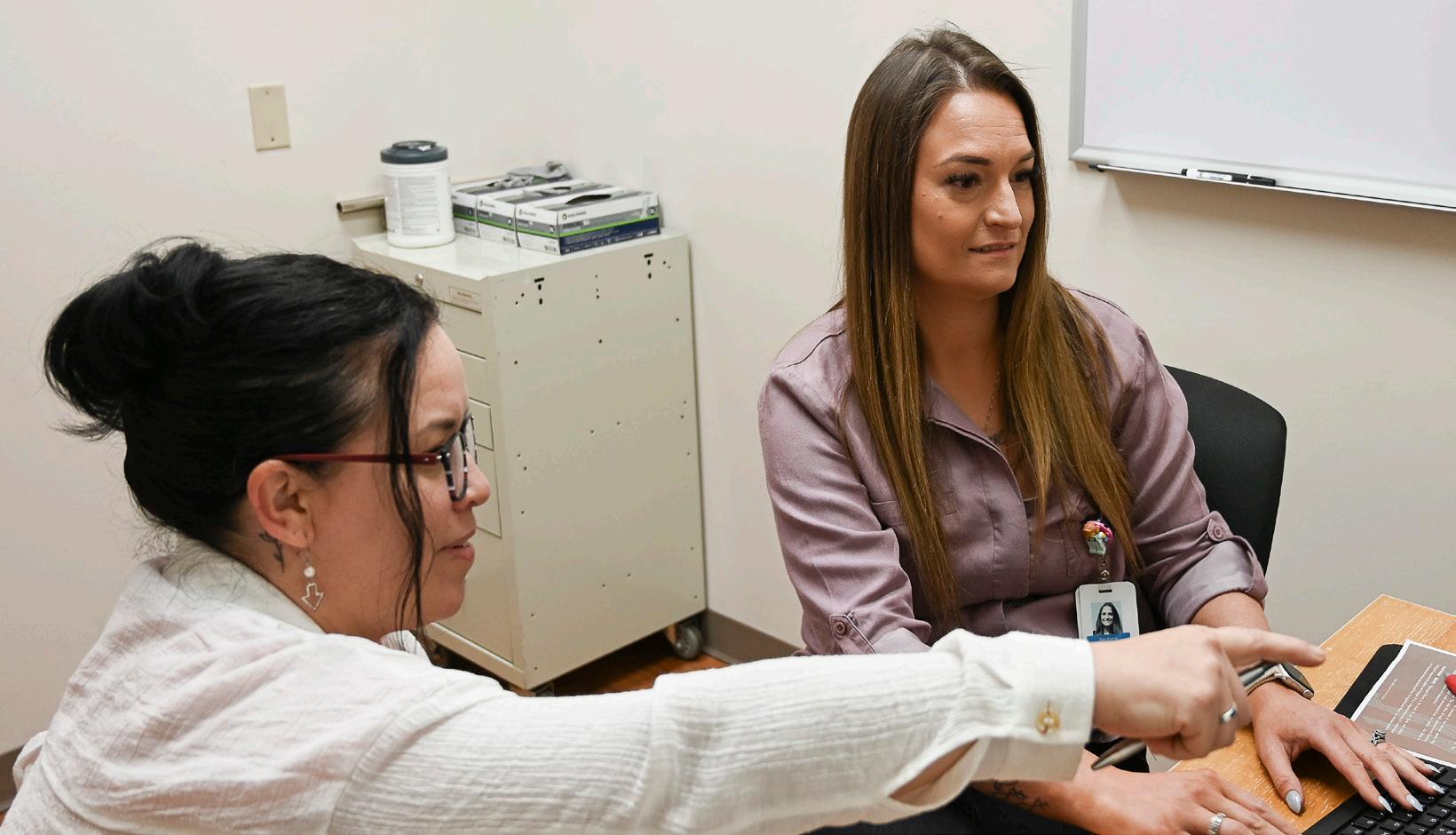
burdens. My job is about relieving doubt and uncertainty, offering guidance and a glimmer of hope.”
Next, meet Stephanie Keyser, also working within Methodist Jennie Edmundson Hospital, focusing on our most vulnerable patients that arrive at the emergency department overnight, often with nowhere else to turn. Stephanie faces an additional challenge: many resources are only available during the day, leaving those in need without support overnight and on weekends. Undeterred, Stephanie seeks creative solutions, such as securing over-the-counter medications and transportation. She collaborates closely with Julia and other CFOC partners to ensure patients are connected to resources during regular business hours.
Stephanie’s passion for this role stems from her personal experience, “I used to be a part of the vulnerable population I now have the privilege to support. I wish there was someone like me when I needed it.”
We extend our deepest gratitude to the Southwest Iowa Region Mental Health and Disabilities Services (MHDS), an anonymous donor, and several other contributors whose unwavering support has made the addition of these positions possible. It is through their generosity that we can continue our mission of providing essential care and support to our community members in need.
Suzanne Watson, CEO of the MHDS Region, played a crucial role in helping build capacity to expand our reach. “The impact of these new positions is an important step forward in strengthening our ability to reach people at a critical time when they are seeking help through emergency care. It paves the way for better working partnerships. We know that coordinating care and follow up is a predictor of better outcomes for individuals as we work together through an expanded team approach.”
We are grateful for the commitment and generosity of our donors, whose contributions will make a meaningful difference for years to come.
Above, Julia Davis (left) discusses patients needing additional resources and extra follow-up with Stephanie Keyser, right.
Overcoming Hopelessness:
Helping to Ease the Burden
One of Caring for Our Communities’ strengths is that case managers focus not only on patients but their families, too. Support and healing can come from many sources and helping those who care for others is a crucial step. The Patrick and Ellen Walters* family of Council Bluffs faced life-altering struggles during 2023. CFOC provided their family with the help and support when they needed it most.
Following a routine endoscopy, doctors diagnosed Patrick with stage four esophageal cancer. Doctors found that the cancer had metastasized and caused a lumbar fracture, which limited his mobility, and leaving him unable to work. At this time, Patrick was referred to Caring for Our Communities by the MJE Radiation and Oncology Center in late 2022.
The Walters had already been facing their share of struggles. Their daughter had been diagnosed with a rare genetic disorder, requiring trips to Minnesota for treatment. Ellen, Patrick’s wife, was unable to work at this time due to a knee replacement, in addition to providing full-time care for her husband and daughter. Ellen took care of the tasks of raising a family, managing appointments and navigating the overwhelming medical system for all three of them.
All of this took its toll on Ellen. The family was trying to survive on the social security payment their daughter received monthly. While not all of our patients or community members need this level of support, Caring for Our Communities was able to connect the Walters family with numerous organizations along their journey.
Caring for Our Communities, in collaboration with the Southwest Iowa Planning Council and the USDA provided:
● A full bathroom renovation to decrease fall risks.
● A replacement for their failing air conditioner unit.
● Updates to the home by replacing several leaking windows and installing a new front door.
CFOC also connected the family with additional resources that included:
● Assisting the family with social security and food stamp documentation and coordinating financial assistance applications.
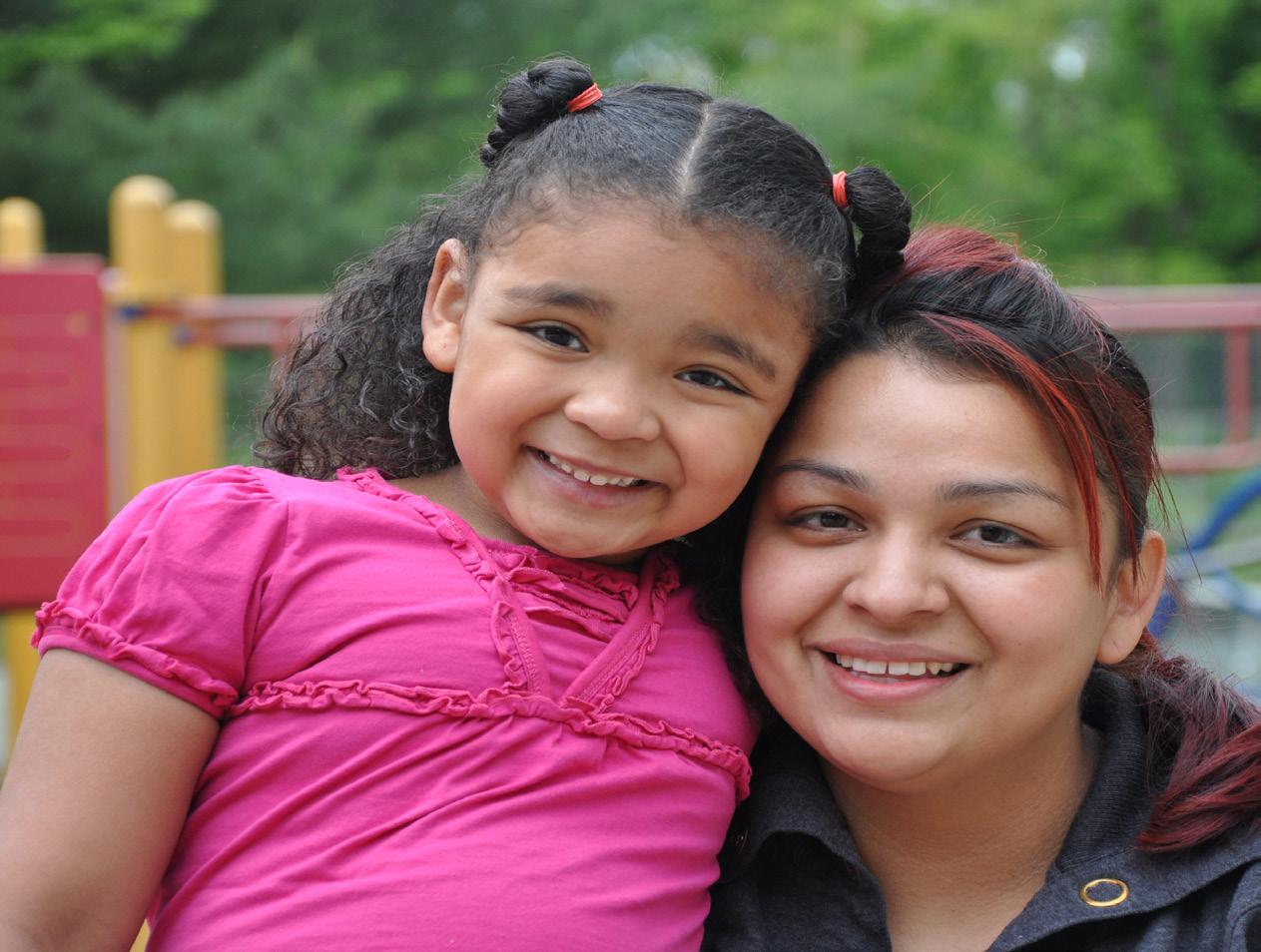
● Referred the family to the Jennie Edmundson Foundation’s Spirit of Courage Fund, which helped them make mortgage payments, as well as provided utility assistance, gas cards for transportation, and grocery funds.
● Helped them apply for funding through the West Central Community Action Program, which also helps with additional utility assistance and gas cards.
Sadly, in November 2023, Patrick lost his battle with cancer. CFOC continued to support the Walters family after Patrick’s passing by providing support for groceries and more through the Secret Santa program in December.
Despite their tragic loss, Ellen’s gratitude to CFOC still shows. Recently, she told her CFOC case manager, Jeanna Bull, “I wanted to thank you for everything you have done for us to help our family out.”
“I’m so grateful we met you and, as I’ve always said, you’re our guardian angel,” praised Ellen. “This is by far the hardest thing we’ve ever done, but we know Patrick is at peace and isn’t suffering anymore. Thanks again for everything!”
*Names and likenesses have been changed to protect patient identity.

To Support our Work: visit www.jehfoundation.org, call the Jennie Edmundson Foundation at 712-396-6040, or e-mail cfoc@nmhs.org.



 Tara Slevin, Chair, Caring for Our Communities
Tara Slevin, Chair, Caring for Our Communities











 Working in partnership with over 20 social service agencies, non-profit organizations and community partners throughout Pottawattamie and Mills Counties.
Working in partnership with over 20 social service agencies, non-profit organizations and community partners throughout Pottawattamie and Mills Counties.





 (Above) Council Bluffs Fire Department Chief Justin James, along with Council Bluffs Police Department Chief Matt Davis, engage in discussion for those working with homeless population.
(Above) Alicia Whitehill, RN, Community Clinical Coordinator at Nebraska Methodist College, presents statistics about individuals who attend the free clinics held at New Visions Homeless Service (NVHS).
(Above) Sergeant Cory Woodward, leads a discussion in regards to current identified homeless camps in the community. HOP has been instrumental in working with the homeless population within these camps and helping them seek additional services needed.
(Above) Council Bluffs Fire Department Chief Justin James, along with Council Bluffs Police Department Chief Matt Davis, engage in discussion for those working with homeless population.
(Above) Alicia Whitehill, RN, Community Clinical Coordinator at Nebraska Methodist College, presents statistics about individuals who attend the free clinics held at New Visions Homeless Service (NVHS).
(Above) Sergeant Cory Woodward, leads a discussion in regards to current identified homeless camps in the community. HOP has been instrumental in working with the homeless population within these camps and helping them seek additional services needed.


